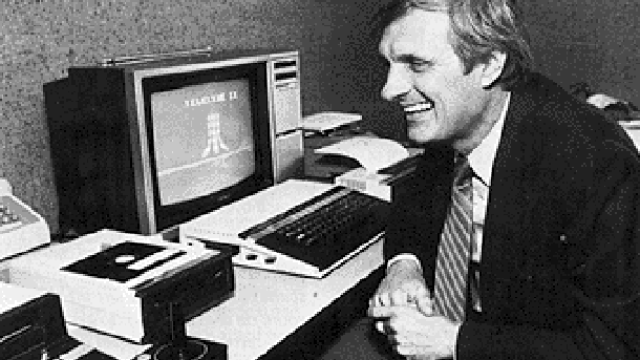
Ray Kassar
1928  New York [USA]
† 2017
New York [USA]
† 2017
Ray Kassar was an American businessman, Chairman and CEO of Atari from 1978 to 1983.
He was hired in February 1978 by Warner Communications to become President of Atari, which Warner had acquired in 1976. At that time, relations between Atari and Warner were already fraying because Atari's old management was made up of engineers, while the new executives coming from Warner, including Kassar, were more entrepreneurial and therefore business-oriented.
The climax of this crisis came in November 1978, when Atari co-founder Nolan Bushnell left due to disagreements over the company's future, and Kassar also took over as CEO.
Under his leadership, Atari underwent major transformations. The atmosphere of respect and friendship that existed at Atari under Bushnell slowly faded because Kassar was a man whose mindset was focused on business.
During Kassar's leadership, the company's sales increased from $75 million in 1977 to over $2.2 billion in 1980. But despite these commercial successes, Kassar showed no appreciation for the game programmers whose sales were the source of the company's profits: their salaries were therefore on par with other employees', and he also prevented them from including their names on the games, believing them to be made by Atari. Kassar referred to them in an interview as "hysterical prima donnas."
Unhappy with this treatment, many programmers left Atari to found their own company, Activision.
One of them was David Crane, whose Outlaw and Canyon Bomber titles brought the company $20 million in revenue in 1978.
Crane and his colleagues had tried to demand recognition for the games they produced and an increase in their salaries, but Kassar had chased them out of his office, apostrophizing, "You're only as important to the product as the guy on the assembly line who puts it together."
With the launch of the Atari 2600 in 1977, with only nine titles available, sales plummeted. So Kassar decided that instead of developing his own game, which had been met with dubious success, it would be better to rely on a surefire hit.
At the time, the game that was a hit in the arcades was Space Invaders, so Kassar decided to personally travel to Japan to deal directly with the developer, Taito. He obtained the rights to the game and entrusted the development of the title to Rick Mauer, who received a compensation of $11,000.
The conversion proved to be an unexpected success, generating a profit of several hundred million dollars from sales of the cartridge and the console, which consumers bought with the idea of being able to play Space Invaders at home.
But after that glorious period, by the end of 1982, Atari's losses amounted to $536 million.
That year, the company published the failed game ET the Extra Terrestrial, considered by critics to be the worst title ever released in the history of video games. Although Kassar was not responsible for the deal to make the video game: Steve Ross, CEO of Warner Communications, personally negotiated with Steven Spielberg to acquire the film rights for a sum of around $20 million. Kassar received news of the deal directly from Ross after it had been completed. When Ross asked him if he liked the idea of making a game based on ET, Kassar replied, "I think it's a stupid idea. We've never made an action game based on a movie." Furthermore, according to Kassar, the decision to produce 5 million game cartridges, a very high number, was always Scott's. The game sold around 1.5 million copies, the vast majority of which were returned to retailers because buyers were unhappy with ET's poor quality and unplayability and wanted their money back.
ET's financial losses came on top of another financially disastrous video game: the 1982 Pac-Man port. Despite being the best-selling Atari 2600 game of all time, with 7 million copies sold, Atari management had overestimated its sales by producing 12 million cartridges. However, Pac-Man proved too different from the original, so sales slowly declined, and many people returned their cartridges, which added to the unsold cartridges.
In July 1983, Kassar was fired due to Atari's continued massive losses.